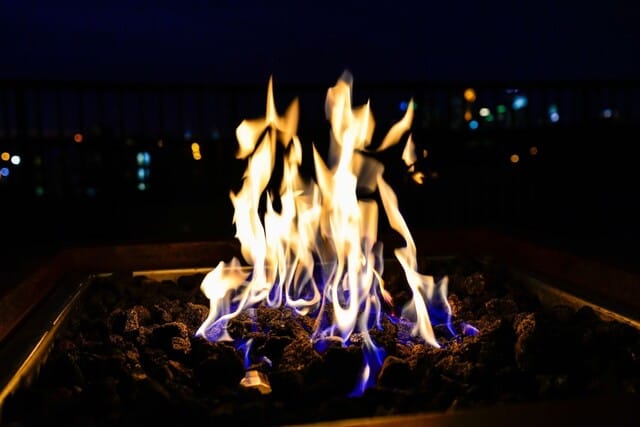There is nothing quite like sitting outside under the stars on a crisp autumn evening with a fire blazing in the fire pit to take the chill out of the evening air. The ambiance that a fire pit brings to your outside entertainment area is special, but what is the best way to generate those warming flames? Propane and natural gas are two popular choices, but can you mix your gas supply? Can a propane fire pit use natural gas?
Most propane fire pits can use natural gas, but a conversion kit is required to modify the fire pit to burn the natural gas properly at its lower supply pressure. Some propane fire pits cannot be converted to natural gas. Therefore knowing your fuel choice is essential. Natural gas is a good choice for a fixed location fire pit.
A fire pit can extend the season to enjoy your outside entertainment area by warming the outdoor space to a comfortable temperature. The sight of a flickering fire and generating warmth also generates a feeling of comfort and helps us relax. Many modern fire pits are designed to use gas as the fuel for the fire, but if you decide on one gas type, are you locked into using that type of gas in your fire pit?
Why Choose Gas For Your Fire Pit?
Traditional fire pits were wood-burning fire pits with their own special atmosphere, like a crackling fire as the wood dries out and burns. However, burning wood in a fire pit comes with some possibly undesirable consequences.
Wood burning fire pits generate smoke which can be an irritating feature to those sitting around the fire. In addition, smoke can enter your home or cause neighbors’ problems when the smoke billows into their backyard or windows.
Wood burning fire pits also generate ash which is a pollutant that can get into your home or your neighbor’s home. Floating embers from a wood fire are another cause for concern and can be a safety hazard. As a result, many local municipalities have instituted by-laws or codes that prohibit the use of wood-burning fire pits in residential areas.
For these reasons, gas makes a sensible, clean-burning alternative that eliminates the problems associated with burning wood in your fire pit. This may be a good read: Gas Fire Pit vs Wood
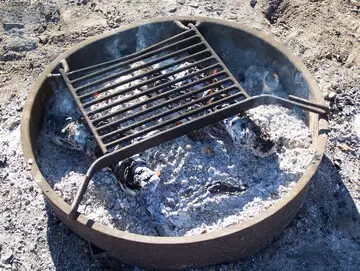
Propane gas and natural gas are the two choices you have available as fuel for your fire pit. There are benefits and disadvantages to both types of gas. Still, a major question is if these two gas options are interchangeable on your fire pit.
Can You Convert Any Propane Fire Pit To Natural Gas?
Most propane fire pits can be converted to use natural gas as a fuel instead of propane. However, there are some types of fire pits where it is impossible to do the conversion, but the manufacturer will have this noted in the instructions for the fire pit. It is also typically noted when purchasing as well.
Not all fire pits are capable of accepting a conversion kit to use natural gas. In most cases where the conversion is not possible, it is due to safety issues that could arise from the way it was manufactured. This result allows a reduced cost Fire Pit but then limits its use to one fuel type.
If the manufacturer expressly states that your fire pit cannot be converted to natural gas, then do not try and DIY the conversion to “make it work.” Suppose the manufacturer states the fire pit is not compatible with natural gas. In that case, it means it is not safe to use with this fuel or with any of the conversion kits produced.
Many propane fire pit manufacturers will produce natural gas conversion kits specifically intended and designed for their propane-burning models.
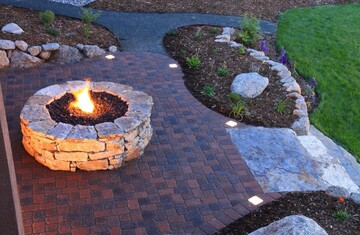
Where possible, it is always best and safest to use a conversion kit made specifically for your fire pit model. Generic conversion kits that could require substantial modifications to the fire pit can pose safety issues. It may not be possible to revert back to using propane in the future or vise-versa.
Can You Hook Up Gas Line To A Propane Fire Pit?
If your home has natural gas, you may be entertaining the idea to convert your propane-burning appliances to use natural gas, including your fire pit. Converting to natural gas brings several benefits for your fire pit, but it is not as simple as changing one gas line for the other.
You can hook up a natural gas line to a propane fire pit, providing that a conversion kit is installed on the fire pit before hooking it up to the gas line. Use the recommended conversion kit from the manufacturer of your fire pit. Unfortunately, not all propane fire pits can be converted to burn natural gas.
Working with gas and gas-burning appliances can be a daunting prospect, given the flammable and potentially explosive characteristics of fuel gas. Many people who consider converting their propane fire pit are concerned about the safety aspect of the conversion.
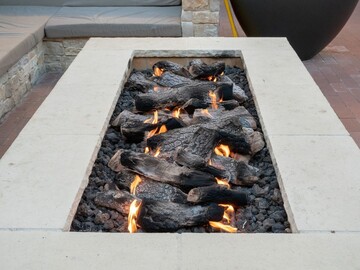
The main reason is that propane has greater pressure than natural gas. The kits usually contain orifices that allow the appropriate amount of gas to the combustion area for the type of gas used. Natural gas operating on lower pressure usually has bigger holes to allow the gas to pass. Natural gas working in higher pressure has smaller holes to minimize gas flow.
Therefore, you cannot just swap gas lines. Depending on which way you swap lines, you will not receive enough gas in the case of propane to natural gas. On the other hand, going from natural gas to propane would allow too much gas. Neither case would be safe.
Is It Safe To Convert Your Propane Fire Pit To Natural Gas?
Safety is the obvious concern when converting a propane fire pit to natural gas. Unfortunately, due to the nature of the fuels used, it is a valid concern.
It is safe to use natural gas for your fire pit. It is safe to convert your fire pit to use natural gas, provided that it can accept the conversion. Check with the manufacturer of the fire pit if your model can be safely converted. You can also hire a professional to do the conversion.
Natural gas is considered a safe fuel to use in your fire pit, and in some respects, it has better safety aspects than propane.
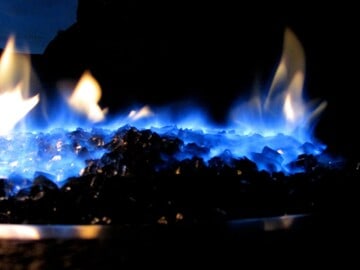
Natural gas operates at a significantly lower pressure than propane, which is better than dealing with high-pressure gas. Natural gas is piped, so there are no large storage tanks that need special care and could pose a safety risk from an explosion.
Natural gas is lighter than air, which means it dissipates into the air quickly, while propane sinks and accumulates, creating more risk for accidental ignition.
There are some aspects to the conversion to natural gas that will make the process safer and reduce the risk.
- Always use a conversion kit. For example, connecting a propane fire pit directly to the natural gas supply without the proper conversion is dangerous.
- Use a recommended conversion kit. If your fire pit manufacturer recommends a particular conversion kit, only use that kit for the conversion.
- Don’t use old gas hoses. When converting to natural gas, use the correct hoses rated for natural gas and get new hoses to use in the conversion rather than old hoses that may be compromised.
- Follow the conversion kit instructions to the letter. Never skip steps in the conversion instructions and always use the parts recommended to complete the project.
- If in doubt, hire a professional. If you are unsure about the conversion and the hookup to your natural gas line, instead hire a certified installer to come in and perform the conversion. The conversion is not difficult, but there is always the potential to go wrong if you are unsure sure of the process.
It is required to have a certified professional perform any work on residential gas lines in some locations. In this case, you may have no option but to get a professional to do the conversion.
Just know what you have if you can…Check out all the conversion kits available on Amazon
How To Convert Your Propane Fire Pit to Natural Gas
Converting a propane fire pit to use natural gas is not a difficult undertaking. Most people who have some form of aptitude for hands-on DIY should perform the conversion with ease.
Depending on the local regulations in your area, you may need a certified gas professional to lay the natural gas line to your fire pit location. This may be a by-law requirement for your city for safety and protection reasons.
In some cases, you can lay the pipe yourself and just get a professional in for the final hookup, testing, and certification.
You will need a basic set of tools to install the conversion kit and hook up the natural gas pipe. A set of standard screwdrivers, a wire stripping tool for electrical connections, a pair of pliers, and a set of wrenches to tighten connectors should be all the tools you need.
You may need some sealing tape to seal the threads of screw-on connectors. Still, the instructions in the conversion kit will tell you of any other materials you will need.
The steps to convert your propane fire pit to natural gas are as follows.
- Ensure your fire pit can be converted to natural gas. If your fire pit is not suitable for conversion, you may have to stick to propane or replace your fire pit with one that is compatible with natural gas.
- Obtain a recommended conversion kit for your fire pit. Use the recommended kit for your particular fire pit model whenever possible rather than a generic conversion kit.
- Remove the propane equipment from your fire pit. First, close the propane tank and remove the hose from the tank. Then remove the propane hose from the fire pit connector. You will also need to remove the propane-specific connectors and nozzles (orifices) from the fire pit.
- Follow the kit instructions to install the natural gas connectors and nozzles. Carefully read the instructions from the kit manufacturer and install the natural gas nozzles and connectors (orifices) on your fire pit. Next, hook up the natural gas pipes to the connectors you have just installed on the fire pit. You may need a professional to do the final hookup to the gas mainline. However, if the pipe has already been provided, connect the line from the kit to the natural gas main pipe using the appropriate connectors.
- Check for leaks. The best way to identify leaks in the system is to turn the gas on and run soapy water over the pipes and connectors. If there is a gas leak, it will form bubbles in the soapy water. If leaks are detected, turn off the gas and fix the leaks by refitting the connectors or replacing faulty pipes/ tubes.
The fitment of the conversion kit and the hookup to the gas line is not difficult, but care must be taken to observe safety measures while working with a gas of any sort.
Always work in a well-ventilated or open area when working with gas. Do not have an open flame, ember, or heat source nearby when working with gas. This includes heating elements, welding machines, lit cigarettes, and other open flames.
When working with gas, striking metal items with a hammer or other object that could produce sparks is also a safety hazard.
What Are The Benefits Of Converting Your Fire Pit To Natural Gas?
Natural gas and propane are both suitable fuels to use for a fire pit. Each has its benefits in certain circumstances over the other fuel type.
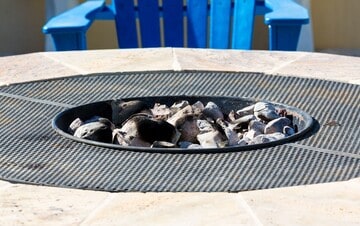
In some cases, propane is the superior choice of gas to use for a fire pit over natural gas. So, let’s take a look at the benefits of both gas types so you can establish which one will be the better performer for your situation.
Benefits of Natural Gas For A Fire Pit
Natural gas has several benefits as a fuel for a fire pit, which may sway your decision in favor of this fuel.
- Natural gas burns cleaner. Natural gas burns cleaner than propane, which means less soot and less cleaning of the fire pit.
- Natural gas is cheaper than propane. (this is the important one) Natural gas is a more affordable option to fuel your fire pit and is considerably cheaper than propane. Natural gas can be up to six times cheaper than propane.
- A constant supply of gas. No need to worry about tanks running out of gas when you want to use your fire pit. The continuous supply piped to your home will ensure you can use your fire pit anytime you need to.
- Natural gas is safer than propane. Natural gas is under less pressure which puts less stress on pies and connectors. Natural gas dissipates into the air quickly, posing less of a fire or explosion risk. No heavy tanks with volatile contents standing around your home.
Benefits Of Propane for A Fire Pit
Propane has some benefits in certain circumstances that may make it a better fuel choice for your fire pit.
- Propane has a nicer-looking flame. When used in a fire pit, propane has a nice orange flame that resembles a wood fire flame more closely.
- Portable fire pits require propane. If your fire pit is portable or movable, it cannot be connected to a permanent natural gas line in a fixed location. In this instance, a propane-fueled fire pit makes more sense.
- Propane has better energy efficiency. Propane burns with greater energy than natural gas, which burns hotter and will heat the area more effectively than natural gas. Propane is about 2.5 times more efficient at heating than natural gas. A volume of propane that puts out 2500-BTU will only generate 1000-BTU from the same volume of natural gas.
- Propane fire pits are cheaper. Because propane fire pits can be moveable, they are generally cheaper than natural gas fire pits that need permanent structures.
- You can take your propane fire pit with your when you move. The portability of propane fire pits allows them to be relocated when you move. In contrast, natural gas fire pits are a fixture in the home.
Conclusion
Natural gas and propane both make good fuel alternatives to burning wood in a fire pit. They are elegant and clean, without the pollution and fire hazard risks of an open wood fire.
Most propane fire pits can be converted to burn natural gas, but this would require a conversion kit installed on the fire pit. Converting to natural gas will also take the portability of the fire pit away, limiting where you can use the fire pit.
In some locations, you can get natural gas stored in tanks, which will allow you to receive the benefits of using natural gas without losing the portability of your fire pit.
Here are our favorite fire pits for each type of fuel…
Propane Fire Pit under $200: Endless Summer 30 Inch Square 30,000 BTU LP Gas Outdoor Fire Pit
Natural Gas Fire Pit under $1500: Elementi Manhattan 36″ Concrete Outdoor 45,000 BTU Natural Gas Fire Pit
If you are contemplating a fire pit for your home, we highly recommend it. Especially if you enjoy a lot of time outdoors or want to get more use out of your entertainment area when the weather turns chilly.
So, which fuel type should you get?
Typically a propane fire pit is less expensive and performs closer to a real wood fire pit. Thus saving you an upfront cost. However, if you know you will be using it a lot, and you are not too far from the house, a natural gas fire pit will save you on fuel cost, and you will never run out of natural gas unless you forget to pay the bill.
The choice of fuel will be a decision you need to make on which format is more suitable to your requirements with a fire pit at your house. Best wishes!


